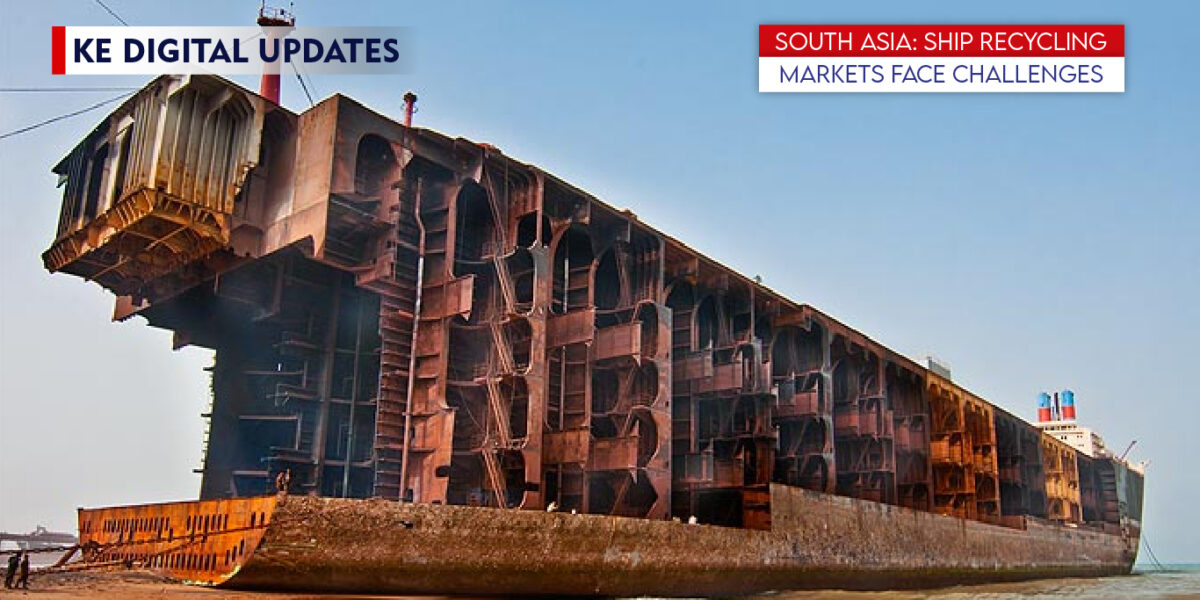Published on January 1, 2025
The ship recycling markets in South Asia, primarily India, Pakistan, and Bangladesh, are grappling with significant challenges. These struggles stem from a convergence of economic and market pressures that have stagnated key ship recycling hubs.
India: Alang Yard
Alang, located on the western coast of India, is one of the largest ship recycling yards globally. However, recent times have seen a notable decline in activity. The primary factors contributing to this downturn include a significant drop in steel prices and a weakening Indian Rupee.
Steel Prices: Steel prices in Alang have plummeted to approximately $450 per ton. This price drop is a critical blow to the profitability of ship recycling operations, which rely heavily on the resale value of steel extracted from decommissioned ships.
Currency Decline: The Indian Rupee has depreciated, compounding the ship recycling industry’s financial challenges. A weaker currency increases the cost of imports and reduces the purchasing power of local businesses.
Lack of New Arrivals: This week, there have been no new ship arrivals at Alang. Consequently, the total tonnage of recycled ships has decreased to 10,123 LDT (Light Displacement Tonnage), reflecting a sharp decline in activity.
Pakistan: Gadani Port
Gadani, once a bustling hub for ship recycling in Pakistan, faces severe economic instability and currency issues. The port has seen no new ship arrivals for nearly three months, leading to a complete operational standstill.
Economic Instability: The overall economic situation in Pakistan is unstable, which has had a ripple effect on the ship recycling industry. Businesses hesitate to invest in new projects or expand operations under uncertain conditions.
Currency Issues: The Pakistani Rupee’s fluctuations have made financial planning and transactions increasingly challenging for ship recyclers.
Steel Prices: Steel prices at Gadani have dropped to $639 per ton. Despite being higher than in Alang, the price drop still impacts the profitability of recycling operations.
Bangladesh: Chattogram Market
Chattogram, another key player in the ship recycling industry in South Asia, is also struggling. The market here is characterized by minimal activity, depressed steel prices, and a depreciating currency.
Steel Prices: Steel prices in Chattogram have fallen to around $521 per ton. This decrease in steel prices undermines the economic viability of ship recycling activities.
Currency Depreciation: The Bangladeshi Taka has been depreciating, similar to the trends in India and Pakistan. This depreciation affects the overall financial health of businesses operating in the ship recycling sector.
Activity Levels: This week, the total tonnage of ships recycled in Chattogram was only 1,969 LDT, indicating a significant drop in the work volume.
Conclusion:
The ship recycling markets in South Asia are facing substantial challenges driven by economic instability, currency depreciation, and declining steel prices. These factors have decreased activity in key ship recycling hubs such as Alang, Gadani, and Chattogram. Addressing these issues will require coordinated efforts from industry stakeholders and policymakers to stabilize the market and ensure the sustainability of the ship recycling industry in the region.


